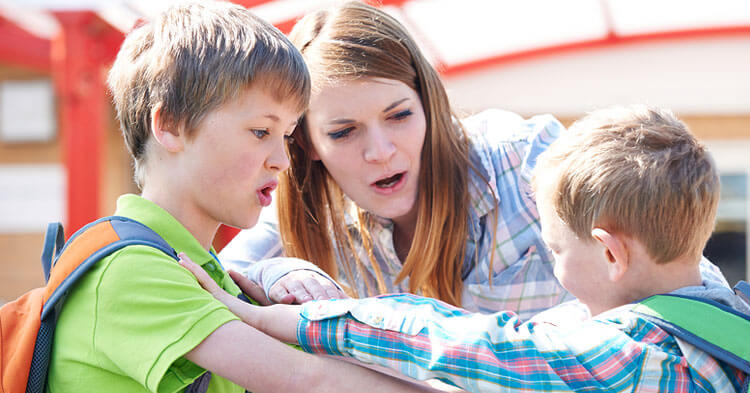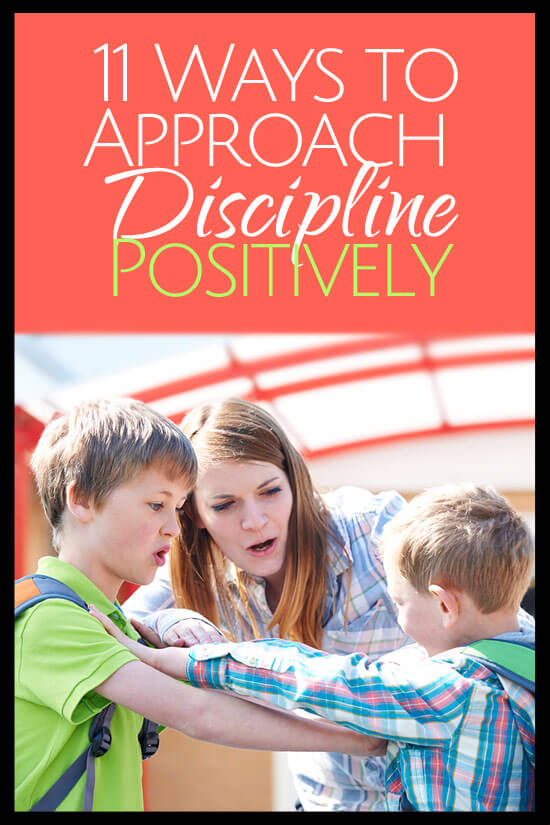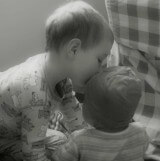11 Ways to Approach Discipline Positively

In my last post, Today I Failed, I shared a story of losing my cool with my sometimes-pesky preschooler. It happens to even the most well-versed parents. I studied child development, practiced as an elementary school teacher, and constantly research best practices, yet I still mess up. All the time. My last blunder motivated me come up with a guideline for dealing with difficult child behavior. Maybe I can even stay conscious of the following ideals in the heat of the moment next time. That’s always the hard part.
Be on their side.
They kick. They scream. They yell and melt. The intensity of my child’s emotions can really work me up, but I have found a powerful phrase that keeps me grounded, and makes my little guy feel understood: “I know it’s hard.” I say this when he struggles with turning off the TV, leaving the playground, getting denied a toy during a Target run or that extra cookie before bed. It’s all so hard! This phrase reminds both of us that we are on the same team. Although it is my job to give him limits, I am still his ally.
Keep their age in mind.
Remember when your one-year-old tore all the books off the shelves and dumped their food on the floor? She wan’t being bad, but acting her age. Just as it’s a young toddler’s nature to get into everything, three-year-olds are wired to test limits. It is also normal for them to have tantrums, and exhibit signs of Obsessive Compulsive and Bipolar disorders (just kidding, but not really). Although we discourage these behaviors, just as we did the food-dropping and book-pulling, it is somewhat relieving to keep in mind that their behaviors, although unpleasant, are age-appropriate.
Discipline is about teaching, not punishing.
These young people are new to the world and have a lot to learn. In situations we feel drawn to scold, simple lessons usually suffice. The other day I let my son deliver something to a neighbor. As I waited in the driveway, I noticed him ring the doorbell like 7 times in a row. I felt the quick urge to yank him away and bark, “What are you doing?!” Luckily I bit my lip because he didn’t yet know doorbell-ringing etiquette, and didn’t deserve criticism. When he met back up with me, I plainly told him about ringing once, and waiting patiently. It was well-received and his dignity was left intact. (Fortunately, the neighbors weren’t home!)
Place clear boundaries, and act on them promptly.
Other times, your child already knows what is expected, but has a hard time listening or adhering to a rule. They aren’t being naughty, just young and human. Stay on their side, and help them. Yesterday, my 3-year-old was throwing his ninja sword up in the air (dangerously close to me, but I’m choosing not to highlight that). I told him not to. Naturally, he did it again. Rather than give him a mean look or yell at him, I took it away and straightly said, “It looks like you are having hard time listening, so I am going to help you.” Acting promptly helped me to not get frustrated at him, and showed him I mean what I say. Let your children know clearly what is expected of them.
Welcome expressions of emotions.
Children won’t always get their way. They won’t be happy with the limits you give. Welcome the tears that may come. They are normal expressions of sadness and frustration. Show them you are comfortable with all their feelings. Sometimes tears may be manipulative- stand strong and let those roll too.
Give power and choices.
Last night, it was time to get ready for bed. Of course, I was met with resistance, “I don’t want to go to bed Mama!” I could have forced him and said “Too bad!” But I looked for a way to give him some power. I said, “It is time. Would you like to walk up yourself or do you want me to carry you on my back?” He chose a piggy-back ride, and we went up happily. Think of ways both of you can win in any given situation.
De-escalate.
When you are getting worked up, there are two choices: lose your cool or de-escalate. Simple phrases can help like, “It’s hard, huh?” and “Do you want space or a hug?” I am always surprised by the power of these questions. He usually says, “Yes mama, it’s hard.” Or he’ll say, “I want a hug.” Just like that, we connect rather than conflict. Sometimes they push you away when they really need closeness.
Remain calm.
I just had a rough week with my preschooler, and I noticed that we were both getting worked up easily. I realized I need to be modeling calmness and control. Even when he was stomping demands at me and insulting my hair and my character, I would coolly say, “Oh, I understand. We disagree.” or “I’ll be happy to listen to you when you talk to me appropriately.” I mean, really, why engage in power struggles with a three-year-old when you are clearly the boss? Acting calmly and in control, teaches them to do the same.
Ignore social pressure.
Sometimes I feel the need to parent in a certain way based on what I think other people expect of me. Who cares if people don’t understand your style? Let ’em judge, and parent from your heart.
Simplify.
All of this parenting stuff requires patience, so keep things simple to minimize feelings of frustration and overwhelm. Nurture yourself, use your crock pot, buy your veggies already diced, and ask for help. If you feel like signing your 3-year-old and 6-month-old up for swimming lessons, just don’t.
Be the boss.
Be respectful and considerate of your child. Give choices and power. But be a fearless leader. Our children’s comfort depends on feeling like they have parents who are in control.
Kids aren’t bad. Even when they are screaming and playing rough near the baby, and not listening to you call their name and ask you for a snack right after you brushed their teeth. They either need to be given a boundary or help respecting it. Self-control is hard, especially when you’re holding things like water guns and have the energy that even a whole pot of coffee couldn’t give us. Children should know that they are good, even when they need help behaving appropriately.
Children absolutely need discipline, but at the heart of it must be connection and trust. The best way to influence our children’s behavior is to have great relationships with them. As they grow, they will navigate tough terrain. Hopefully, they will see us as safe and accepting; people to turn to, rather than hide from, even during their funkiest phases.
When all else fails, let’s hand our kids to our nearest neighbor, pour ourselves a drink, and press the reset button.
When we mess up, which we will, let’s forgive ourselves as quickly as we do our children. We’re all human doing the best we can.
Read more posts in the Family Room
Pin it for later:

This post was syndicated with expressed permission from Amanda Elder.








